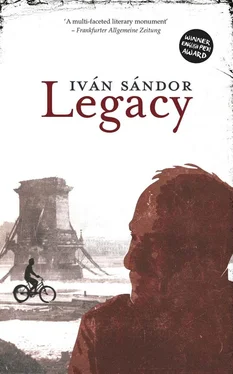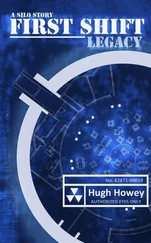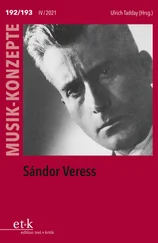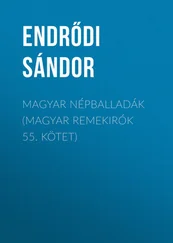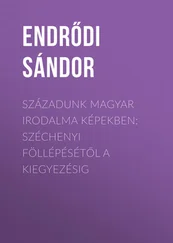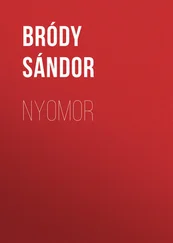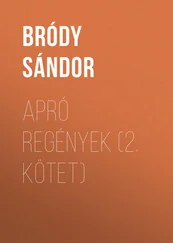Number 65, dateline Budapest, 3 April 1944, Reich Ministry for Foreign Affairs. The reaction of the inhabitants of Budapest to the two air raids has led to a strengthening of anti-Jewish dispositions in wide circles. Yesterday handbills were also distributed which demanded taking the lives of 100 Jews for every Magyar killed. Even if this is unrealizable as it means that we would need to kill at least 30,000–40,000 Jews. A huge opportunity for propaganda lies in the principle of retribution by acing as a deterrent. In the course of my discussion with Ministers Jenő Rátz and Antal Kunder I perceived that a measure of this nature may be implemented without any further ado. I request instructions as to whether I may embark on such measures after the next air raid.
Veesenmayer
After dessert Feine suggests they stroll over to the coffee room. The head waiter accompanies them. Through the window Lutz can see that the Fórum Cinema House is screening the 1944 hit film Az afrikai vőlegény (The African Fiancé) with Kálmán Latabár in the lead role.
Feine asks for coffee with milk. Raising the saucer to his lips he asks Lutz in a whisper to give his word of honour that he will not breathe a word about their conversation to his superior Ambassador Jaeger or even his spouse, die gnädige Frau Gertrud, as he puts it, because if the briefing should leak out it could not be ruled out that he might the victim of an unfortunate accident.
Lutz asks him how long he has been aware that people are being gassed at Auschwitz. We are engaged in a war, says Feine. He said that with a run-of-the-mill air, Lutz was later to recollect. I’ve been photographed together with a murderer, he says. Feine’s expression immediately changes. He was a discharged SS officer, Lutz adds hastily; on the picture we are standing next to each other, and I have an arm around his shoulders. Feine can’t take in what he is driving at. He pays for both of them. The head waiter glides in front of them in order to open the swing door.
Once back in his office Lutz takes down from the wall the picture in which he is posing with the German punt man. That evening Gertrud notices the gap on the wall and after some rummaging comes across the photograph in one of the drawers of the writing desk. She pins it back up. You were fond of it, she says to Lutz the next day.
It crosses Lutz’s mind that it should have been ripped in two long ago. That student to whom I handed the Leica to make the shot did a good job. He had not known then that the limping flatboat man had been a guard at Auschwitz.
Tell me, do you understand why the Jews want to be Hungarian at any cost? Gertrud asks. Lutz is glad to have got off the subject of the photograph. No, he doesn’t understand, he says. Not that he doesn’t understand that either, although that is what he would like to say. He has a lot of things to say, but those matters it would be good to speak about are unsayable — but not because they were things he had given his word to Feine that he would keep quiet about.
He was to write later:
When, in May 1942, three young members of the Czech resistance fatally wounded Reinhard Heydrich, one of the most brutal tyrants in history, I was in Budapest. We all knew about the reprisal action, the way the entire village of Lidice was razed to the ground, obliterated, the men brutally executed and the womenfolk and children deported. When the news first came through that the Germans had annihilated millions of people in Auschwitz and other concentration camps at first I, too, sitting in my study in Budapest, found it hard to believe. When I made enquiries at the German Embassy an acquaintance of mine would only say in a whisper that one was not supposed to know about that and it was better not to. Then in April 1943 we learned about the Warsaw Ghetto uprising; we knew the Germans had sent in armed trucks and tanks, and the last 40,000–60,000 Jews were literally burned to ashes …
I see Gizi’s steps, despite only being able to see Mother’s look as she tells me what she had later learned from Gizi.
Mother seems not to be relating something she had heard from her aunt but telling some ancient story, as if she were hearing Gizi’s voice from the dim and distant past and not just a few months after the things she was talking about had happened, in a voice that was already husky when she was young. You know, Gizi says to Mother, I may have been seen with Károly before he was arrested with the resisting officers. When those animals gunned him down at the street corner, someone could well have squealed on me. I suspected the situation could be dicey in that neighbourhood, so I went back to Lutz at the Swiss Embassy. His wife is a nice woman, a bit flirtatious, but that’s part of it. Of what? I asked Gizi, Mother says with a face as innocent as it could be. When she asked Gizi what was it a part of, Well, a part of the whole mess of war, dear, said Gizi, giggling at the innocent face Mother had put on in asking the question.
The looks in people’s eyes, on their faces, are more important than events. Perhaps that’s a frivolous thing to say, but then again perhaps it isn’t. For me the memory of looks is more important because events make their way into them, and one has only to move forward from the look to the sense and from the sense to the events. The shits squealed, Gizi says to Mother, and Mother pronounces ‘the shits’ with some embarrassment when she tells me.
Gizi could not have stayed at the Swiss Legation, but then she did not want to, I learn from Mother. She only wanted to glean information on how she might get in touch with those of Károly’s fellow officers who had survived, although it was also important for her to wait until the freshly printed Schutzbriefe were brought from the printer. When she had got hold of those she went over to the ICRC home on Munkácsy Mihály Street. I sent a message from there to one of the He-Halutz groups, she told Mother, that I had the safe-conduct passes. The sleuths who might have seen me with Károly had sniffed out where I was, it might even be that one of those who had me nabbed was somewhere in the chain, but anyway that same evening two plainclothes men came for me. Follow us, madam, that’s all. No big deal. Grey trilbies, overcoats with black velvet collars, I didn’t have the slightest idea where they were taking me, and they sat me in a taxi, which must be heading for 60 Andrássy Avenue, 3or so I thought, but we get out in front of the Astoria, go across the entrance lobby, down the staircase, and that’s when it springs to Gizi’s mind that in the past it had been possible to go down those stairs to a basement wine bar. The four of us once went there with your father and Gizi’s husband when he was still alive, so Gizi asks the two trilbies — you know what she’s like, everything no sweat — she asks, I don’t suppose you gentlemen are inviting me out for a dance?
Gizi is being held in a Gestapo slammer.
A major is interrogating her.
Gizi does not ask for an interpreter. The major is clean-shaven, and when he leans forward Gizi catches the whiff of his aftershave. He had conspicuously long fingers, Gizi says later. Just imagine, says Mother, she even asked the major if he was a pianist.
The major is so astonished that he promptly responds. No, an electrical engineer.
I just thought your fingers have such graceful lines, but, of course, an electrical engineer may need his hands for equally delicate tasks.
Averting his gaze from Gizi’s provocative glances the major poses his questions. The things you imagine, Gizi laughs. My tasks are set by no less than Herr Friedrich Born, the head of the International Committee of the Red Cross himself. You must be acquainted with him, Herr Major. And how had she come into contact with Herr Born? Oh, at a reception! He was pointed out to me. He was looking to take somebody on who spoke perfect German and had nursing experience.
Читать дальше
